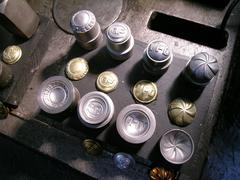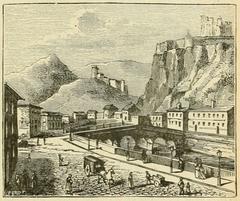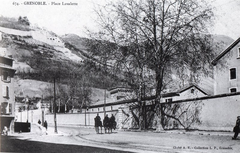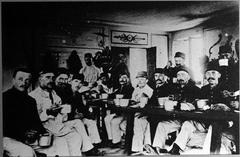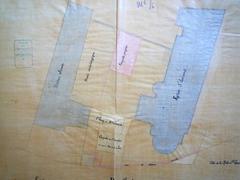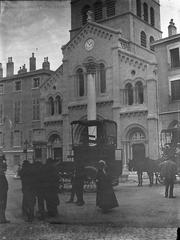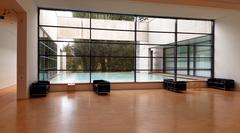
Musée De L’Ancien Évêché Grenoble: Visiting Hours, Tickets, and Historical Sites Guide
Date: 04/07/2025
Introduction
Nestled in the heart of Grenoble’s historic center, the Musée de l’Ancien Évêché stands as a remarkable testament to the region’s layered history. Housed within the former Bishop’s Palace, dating back to the 13th century, the museum offers an immersive exploration of Isère’s archaeological, religious, and cultural heritage. From the Gallo-Roman city wall and early Christian baptistery unearthed during late 20th-century excavations to thoughtfully curated exhibitions spanning prehistory to modern times, the museum is a must-visit for anyone interested in the evolution of Grenoble and the wider region (grenoble-patrimoine.fr; wikipedia).
This guide provides all the essential information you need to plan your visit: from opening hours and ticketing policies (with free admission for all) to accessibility details, collection highlights, and nearby attractions. Whether you’re a history enthusiast, a family seeking educational experiences, or a traveler exploring Grenoble’s cultural sites, the Musée de l’Ancien Évêché offers something for everyone (musees.isere.fr).
Table of Contents
- Historical Overview & Architectural Significance
- Museum Collections & Exhibitions
- Practical Visitor Information
- Educational & Family Activities
- The Museum Garden
- Nearby Historical Sites & Attractions
- Dining, Facilities & Travel Tips
- Frequently Asked Questions (FAQ)
- Plan Your Visit & Stay Connected
- References
Historical Overview & Architectural Significance
Origins and Early History
The Musée de l’Ancien Évêché occupies the former Bishop’s Palace, whose origins trace back to the 13th century. Archaeological discoveries during 1989 tramway construction unearthed remnants of the city’s first wall (late 3rd century CE) and an early Christian baptistery (4th to 10th centuries), both now showcased in the museum’s lower levels (grenoble-patrimoine.fr; wikipedia; trek.zone). These finds reveal Grenoble’s strategic and religious importance from antiquity onwards.
Medieval and Modern Developments
Constructed adjacent to Cathédrale Notre-Dame, the palace served as the bishops’ residence and administrative center, featuring architectural features such as a 17th-century façade and a Baroque staircase (1654). A 19th-century Bishop’s Chapel in Restauration style adds a revivalist touch, frequently hosting temporary exhibitions (grenoble-patrimoine.fr).
Modern Rediscovery and Museum Foundation
Following the major excavations of 1989, architects undertook a sensitive restoration, integrating archaeological remains into the museum’s design. The Musée de l’Ancien Évêché opened in 1998, dedicated to presenting Isère’s history from prehistory to the present (wikipedia).
Museum Collections & Exhibitions
Permanent Collections
Archaeological Treasures: The Early Christian Baptistery
A highlight is the early Christian baptistery in the basement, one of the oldest Christian monuments in the region. Visitors can observe the baptismal font and remnants of the structure, with multimedia guides and reconstructions providing insights into ancient practices (musees.isere.fr, cityzeum.com).
“L’Isère en histoire”: A Chronological Journey
This permanent exhibition traces Isère’s history across 11,000 years:
- Prehistoric artifacts, including the region’s oldest human fossil
- Roman and medieval relics such as the croissant de Jade, mosaic aux Perruches, and casque de Vézeronce (agendaculturel.fr)
- Liturgical objects from the palace’s ecclesiastical past
- Modern and contemporary displays using multimedia and cinematic projections
Interactive tools and audioguides in French and English enhance the visitor experience (grenoble-tourisme.com).
The Building as a Collection
The palace itself, a protected Monument Historique, is a masterpiece of medieval, Baroque, and modern architectural elements seamlessly combined (grenoble-tourisme.com).
Temporary Exhibitions
“À l’assaut des châteaux forts ! Les archéologues racontent” (2024–2025)
Running November 15, 2024 – September 21, 2025, this exhibition explores medieval fortifications in Isère, presenting archaeological finds, immersive installations (including a recreation of Château de Theys’ great hall), and interactive activities for families (nosalpes.eu; grenoble-tourisme.com).
“Parcours revisité – Le costume en histoire” (2024–2025)
Part of the “Des habits et nous” season, this exhibition (May 18, 2024 – October 31, 2025) examines the evolution of costume in Isère, featuring historical garments, accessories, and interactive displays (auvergnerhonealpes-tourisme.com).
Notable Objects and Artifacts
- Croissant de Jade: Prehistoric artifact symbolizing early regional presence
- Mosaïque aux Perruches: Roman mosaic with parakeets (agendaculturel.fr)
- Casque de Vézeronce: Helmet from the 524 AD battle
- Liturgical silverware and textiles from the palace’s ecclesiastical use
Practical Visitor Information
Location & Access
- Address: 2, rue Très-Cloîtres, 38000 Grenoble, France
- Public Transport: Tram B “Notre-Dame-Musée”, Bus lines to “Notre-Dame” or “Victor Hugo”
- Parking: Limited in Old Town; use garages “Parking Philippeville” or “Parking Notre-Dame Musée” (planetware.com; whichmuseum.com)
Visiting Hours
- Tuesday to Sunday: 10:00 AM – 6:00 PM
- Closed Monday and major public holidays (January 1st, May 1st, December 25th)
- The garden opens 30 minutes after, and closes 30 minutes before, the museum (winter closure at 5:00 PM) (musees.isere.fr)
Tickets & Admission
- Free entry for all visitors (musees.isere.fr)
- Special exhibitions or guided tours may require reservations; check the official museum website for updates
Accessibility
- Ramps and elevators throughout; accessible restrooms available
- Some archaeological areas may have uneven flooring—contact museum for specific needs
Visitor Facilities
- Air-conditioned galleries
- Non-supervised cloakroom and lockers
- Restrooms on each floor
- Gift shop with books and souvenirs
Educational & Family Activities
- Interactive tablet guides (French/English) available free at the entrance (museemusee.com)
- Guided tours and workshops for families and school groups, covering archaeology, medieval history, and costumes (grenoble-tourisme.com)
- Special events: e.g., Nuit des Musées, with performances and themed tours (agendaculturel.fr)
The Museum Garden
A tranquil space for relaxation, the garden offers open-air views of the episcopal complex and is accessible during museum opening hours (musees.isere.fr).
Nearby Historical Sites & Attractions
- Cathédrale Notre-Dame de Grenoble: Adjacent Gothic cathedral (planetware.com)
- Place Notre-Dame / Place aux Herbes: Vibrant city squares, markets, and local events
- Musée de Grenoble: Fine arts museum with works by Monet, Picasso, and more
- Musée Archéologique Saint-Laurent: Archaeology museum with medieval frescoes
- Musée Dauphinois: Alpine culture and history in a former convent
- Fort de la Bastille: 19th-century fort, accessible by cable car, with panoramic city views
- Jardin de Ville: Historic park along the Isère River
- Museum of the Resistance and Deportation of Isère: WWII history and French Resistance museum
Dining, Facilities & Travel Tips
- Nearby dining: Old Town cafés and restaurants near Place Notre-Dame, offering Dauphinois cuisine
- Picnic: Jardin de Ville and Isère riverbanks are ideal for outdoor meals
- Weather: Grenoble has warm summers and cold winters—dress accordingly (wanderlog.com)
- Tourist Office: 14 Rue de la République for maps, info, and advice
Frequently Asked Questions (FAQ)
Q: What are the Musée de l’Ancien Évêché visiting hours?
A: Tuesday to Sunday, 10:00 AM – 6:00 PM. Closed Mondays and public holidays.
Q: Is admission free?
A: Yes, entry is free for all visitors.
Q: Are guided tours available?
A: Yes, in French; check schedules or arrange in advance.
Q: Is the museum accessible?
A: Yes, ramps, elevators, and accessible restrooms are provided.
Q: Can I take photos?
A: Non-flash photography is generally permitted except in some temporary exhibitions.
Q: What’s the best time to visit?
A: Mornings or late afternoons on weekdays tend to be quieter.
Plan Your Visit & Stay Connected
For the latest updates on exhibitions, events, and visitor information, visit the official museum website or contact:
- Phone: +33 (0)4 76 03 15 25
- Email: [email protected]
Download the Audiala app for curated audio tours and related articles. Follow the museum and Audiala on social media for news, tips, and special offers.
References
- This guide was compiled using information from (grenoble-patrimoine.fr), (wikipedia), (musees.isere.fr), (guide-tourisme-france.com), (planetware.com), (revigorate.com), (auvergnerhonealpes-tourisme.com), (agendaculturel.fr), (cityzeum.com), (trek.zone), (museemusee.com), (nosalpes.eu), (wanderlog.com), (whichmuseum.com), (tourspilot.com), and (grenoble-tourisme.com).

